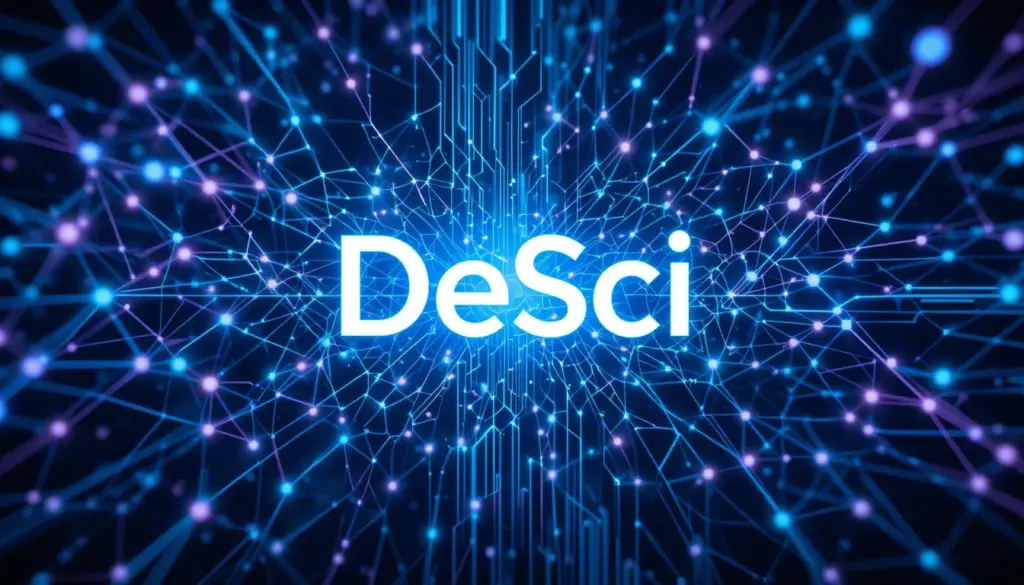For a long time, traditional scientific research has been a cornerstone of human progress. However, it faces persistent challenges like funding limitations, restricted information sharing, and intellectual property disputes. Now, a powerful movement called Decentralized Science (DeSci) is emerging, fueled by Web3 technology, to address these issues and open up new frontiers in scientific exploration. The growing interest from crypto heavyweights such as Binance’s CZ (Changpeng Zhao), Coinbase’s Brian Armstrong, and Ethereum’s Vitalik Buterin signifies that DeSci is moving beyond a mere concept to a potentially transformative reality. Let’s delve into the world of Decentralized Science.

Why the Buzz Around Decentralized Science (DeSci)?
A key driver behind the recent surge in DeSci’s popularity is the enthusiastic support and investment from leaders within the cryptocurrency industry. Their involvement lends significant credibility to DeSci and is crucial in attracting innovative technologies and capital into the field.
Changpeng Zhao has expressed a deep interest in DeSci, recognizing the potential of merging biotechnology research with cryptocurrency technology. He believes that crypto innovations can dramatically accelerate the funding and progress of biotech research. He has actively participated in discussions about DeSci with figures like Vitalik Buterin, highlighting the sector’s vast potential. Buterin himself has emphasized DeSci’s capacity to resolve the inefficiencies and lack of transparency inherent in traditional centralized science ecosystems, ultimately maximizing research efficiency and openness.
Brian Armstrong, through the science community connection platform ‘ResearchHub,’ actively supports collaboration among researchers. ResearchHub fosters an environment where researchers can share papers, engage in discussions, and reward each other with ResearchCoin (RSC), encouraging greater participation within the scientific research ecosystem. The proactive support from these crypto leaders is propelling the DeSci movement from theoretical discussions toward tangible innovation.
The Persistent Problems of Traditional Scientific Research
The emergence of the DeSci movement is rooted in the long-standing issues plaguing the conventional scientific research system:
- The “Valley of Death” and the Crisis in Basic Research: The “valley of death” phenomenon, where groundbreaking basic research fails to translate into practical commercial applications and societal impact, has been a persistent challenge in the scientific community. Even luminaries like Peter Higgs have criticized the excessive pressure for productivity in modern science, pointing out the neglect of long-term basic research.
- The Closed World of Academic Publishing: The prevalent pay-to-access model of most scientific journals makes it difficult even for researchers within the field to freely access the latest information. This significantly hinders knowledge sharing and academic advancement, underscoring the need for open access initiatives like Sci-Hub.
- The “Publish or Perish” Culture: Excessive pressure to publish often leads researchers to prioritize short-term results and publications over in-depth research and collaboration. This culture discourages data sharing and cooperation, creating a negative cycle that impedes the healthy progress of scientific inquiry.
- Widespread Intellectual Property Disputes: Conflicts over intellectual property ownership between researchers and their institutions consume valuable energy that should be dedicated to research, often causing significant delays in the research process itself.
Decentralized Science (DeSci): Offering Innovative Solutions
DeSci leverages the powerful capabilities of blockchain technology to offer multifaceted solutions to the fundamental problems of the existing scientific ecosystem:
✅ Decentralized Funding Mechanisms
DeSci moves away from traditional bureaucratic and competitive grant funding models by introducing innovative funding approaches based on blockchain, such as crowdfunding and the issuance of research project tokens. A prime example is VitaDAO, a decentralized funding platform for longevity research that allows anyone to invest in and participate in early-stage research. This reduces dependence on large institutional investments and lowers the barrier to securing research funding.
✅ Open and Transparent Publishing
DeSci champions the free sharing and accessibility of research findings. By rewarding researchers with tokens for their participation in the peer review process, it encourages voluntary collaboration and contribution, fostering a more transparent and open scientific community than the traditional paywalled model. This accelerates the dissemination of research results and promotes academic exchange.
✅ Efficient Research Collaboration
Decentralized Autonomous Organizations (DAOs) provide a new environment where research teams across the globe can collaborate efficiently without geographical limitations. AthenaDAO, for instance, is a DAO focused on women’s health research, supporting studies on issues like ovarian aging, menopause, and endometriosis that have historically been underfunded. DAOs facilitate transparent decision-making processes for setting research directions and managing collaborative projects effectively.
✅ Innovative Intellectual Property Management
DeSci introduces novel ways to represent and manage research intellectual property (IP) as digital assets using Non-Fungible Tokens (NFTs). Molecule Protocol offers an IP-NFT framework for biotech projects, empowering researchers to strengthen their ownership and control over their research outcomes and raise funds in the early stages of development. This increases the potential for commercializing research findings and provides greater incentives for researchers.
✅ Secure and Transparent Data Sharing
DeSci establishes a foundation for the safe and transparent sharing of research data through decentralized storage solutions. GenomesDAO has created a user-owned genomic database, allowing individuals to securely store their DNA data and decide whether to share it for research purposes. This helps achieve the dual goals of protecting personal information and advancing medical research.
Key Projects Driving the Decentralized Science (DeSci) Movement
At the forefront of the Decentralized Science (DeSci) movement are various projects actively working to revolutionize the traditional scientific ecosystem:
✅ VitaDAO
Focused on funding early-stage research aimed at extending healthy human lifespans, VitaDAO has raised over $4 million. Supported by figures like Pfizer and Balaji Srinivasan, this DAO aims to disrupt the traditional pharmaceutical industry’s monopoly and increase access to new therapies.
✅ ResearchHub
Founded by Coinbase’s Brian Armstrong, this platform serves as a central hub for scientific discussion and encourages researcher engagement. It rewards contributions such as paper uploads, comments, and peer reviews with its native token, ResearchCoin (RSC), aiming to accelerate scientific discovery.
✅ Molecule Protocol
This platform connects biomedical research projects with potential investors using blockchain technology. By introducing the innovative concept of IP-NFTs, it digitizes and facilitates the trading of ownership in research intellectual property, helping to address the funding gap in early-stage research.
✅ AthenaDAO
A DAO dedicated to women’s health research, AthenaDAO supports studies in areas like ovarian aging, menopause, and endometriosis that have historically received insufficient funding, working to improve understanding of women’s health issues.
✅ GenomesDAO
This project is building a user-owned genomic database, empowering individuals to securely manage their DNA data and selectively share it for research purposes. This innovative approach aims to advance genomic research while enhancing personal data privacy.
✅ Bio.xyz
An accelerator focused on supporting biotech-centric DAOs, Bio.xyz helps launch and fund DeSci projects. It provides a launchpad for token auctions, enabling both DAO participants and external investors to support groundbreaking scientific initiatives.
Challenges and Future Prospects of Decentralized Science (DeSci)
While the DeSci movement holds significant potential to overcome the limitations of the traditional scientific research system and drive innovative change, there are still challenges to address:
- Project Quality Control: While DeSci projects rely on community-driven decision-making, a lack of transparency in project review processes and the limitations of community voting can lead to the risk of lower project quality and research directions swayed by popular trends.
- Centralization Issues within DAOs: Despite the decentralized nature of the DAO model, some projects exhibit centralized governance issues where a small number of token holders wield excessive influence in decision-making. This can undermine the fundamental principles of DAOs and hinder the goal of establishing truly decentralized decision-making systems.
- Data Privacy and Security: While blockchain technology can enhance data security, securely managing sensitive scientific data on decentralized networks remains a complex challenge. Maintaining the benefits of open science while adhering to stringent data protection regulations like GDPR requires careful consideration and technological solutions.
Despite these challenges, the future of DeSci appears incredibly promising. The active involvement of cryptocurrency industry leaders and the integration of blockchain technology are poised to unlock new possibilities in scientific research. DeSci has the potential to provide tangible benefits to researchers and society as a whole by fostering a more open and collaborative research environment, ultimately driving the expansion of human knowledge and societal progress. It’s time to pay close attention to this massive wave of innovation and actively participate in shaping the bright future of scientific research.


